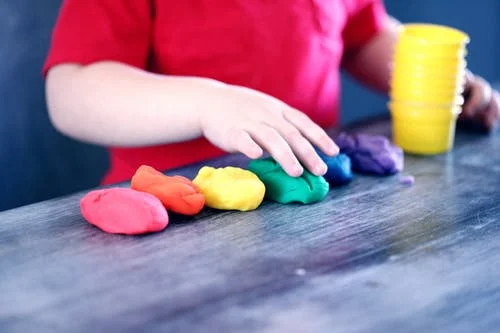NORTHERN RIVERS COUNSELLING & CHILD CENTRED PLAY THERAPY
wendy.taylor@northernriverscounselling.com
Supporting children as they develop self-esteem, resilience and a movement towards healing.
Play Therapy helps children express their inner experiences. Toys are the child’s words and play is their language.
WHAT IS PLAY THERAPY?
Play Therapy is a gentle, non-directive and non-judgemental method of therapy for children aged between 2.5 – 11 or 12 years. Play Therapy helps children communicate their inner experiences through the use of toys, creative resources and play. Within a therapeutic relationship and a safe environment, children have the freedom to explore, process, and express their inner world. It is based on the belief that children possess the internal drive to achieve wellness. Conventional talking therapies may be inappropriate for children and young people who struggle to find to find the words to express themselves.
HOW CAN PLAY THERAPY HELP?
Play is the most natural way for children to communicate. Through Play Therapy children can be helped to explore and make sense of their feelings. By processing their issues and concerns through play, children can develop resilience and coping skills that will help them throughout life. Play Therapy can help children feel empowered and develop a stronger sense of self.
WHO IS PLAY THERAPY FOR?
Play therapy is an effective intervention for children and adolescents experiencing social or emotional difficulties resulting from life events, traumatic experiences, or mental health difficulties. Play Therapy can be effective for children experiencing:
Low self-esteem
Bullying and social issues
Adjustment to change
Grief and Loss
Separation or Divorce
Trauma
Chronic Illness
Abuse and/or Neglect
Bonding and Attachment Issues
Anger Fear Depression
Shyness
Selective Mutism
Autism
ADHD
More about Play Therapy
Adverse childhood experiences in the early years can impact negatively on a wide range of future outcomes for children. Early intervention has become a distinct feature of positive transformational outcomes for children as they develop into young adults.
Play Therapy is a creative counselling intervention that provides children with opportunities to explore and resolve troubling thoughts, feelings, experiences and worries in developmentally appropriate ways. Play Therapy provides healing for hurts and sadness, breaks down tension, and releases pent-up urges for self-expression. Play Therapy has a strong theory base and a substantial body of evidence that supports it as a recognised effective psychological intervention.
Play is an integral part of childhood occurring at all times, in all places, across all cultures. Play is a unique medium that facilitates the development of expressive language, communication skills, emotional development, social skills, decision-making skilss, and cognitive development. Play is a medium for exploring interpersonal relationships, experimenting with adult roles, and understanding one’s own feelings. Play is a complete form of self-expression.
The benefits of play have been studied across the decades by many developmental psychologists and theorists. Play has been described as a form of letting go, merging freely into experience, and immersing oneself totally in the moment. Play is free-form, opening and expanding in unexpected and unpredictable ways. Play is self-directed and spontaneous, it provides internal rewards of self-expression and discovery of one’s own capabilities. Play provides opportunities for creating model situations where children can master reality by experimenting and planning. Energy, life, spirit, surprise, awakening, renewal are all qualities of play.
There are many situations and experiences throughout childhood where children feel they have little or no control. Play is a way for children to to work through accompanying feelings of anxiety and fear, and reestablish a sense of control in their lives. Through Play Therapy children express outwardly what has taken place, and what is taking place inwardly. Through this process children resolve conflicts and growth occurs.









